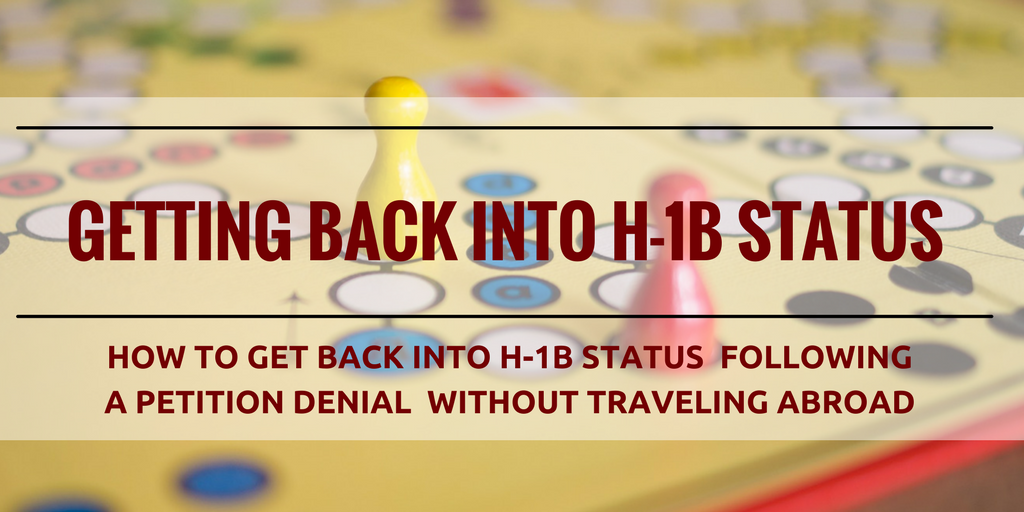Restoring H-1B Status Following H-1B Petition Denial Without Travel Abroad
It is not a secret that the last several month have brought a great increase in the rate of RFEs and denials on H-1B petitions – mainly focusing on the specialty occupation and right to control issues. As a result, there has been a corresponding increase in the rate of denials and in a number of cases H-1B workers have found themselves without valid status (or being unlawfully present) as a result of such a denial.
This is especially true for H-1B extensions where the underlying H-1B term has expired and the H-1B extension has been denied or with H-1B transfer cases where the H-1B worker has left one employer and started working for the new employer on the basis of a pending H-1B transfer but later this H-1B transfer is denied. Our office has seen (and successfully handled) increasing number of such H-1B out of status cases and we would like to share some strategies for getting back into H-1B status without having to travel outside of the U.S.
Discretionary Request for Grant of Status
The key to being able to “gain” back H-1B status is to file a new petition (same or a new employer) and request a discretionary grant of status as part of such new petition’s approval – this kind of request is often called nunc pro tunc when it asks USCIS to grant an approval with retroactive validity dates.
USCIS regulations in 8 CFR 214.1(c)(4) permit approval of an application to extend status when the H-1B worker is not maintaining valid status at the time of filing in circumstances where (i) the delay of the new H-1B filing was due to extraordinary circumstances beyond the control of the applicant or petitioner, and the Service finds the delay commensurate with the circumstances; (ii) the alien has not otherwise violated his or her nonimmigrant status; (iii) the alien remains a bona fide nonimmigrant; and (iv) the alien is not the subject of deportation proceedings. Essentially, USCIS allows a petitioner to request discretionary approval of status when the petitioner can demonstrate that these elements are met.
This provision allows petitioners (refilling by the same or a transfer by a new employer) to file an H-1B petition for a beneficiary who has “fallen” out of H-1B status as a result of a prior H-1B denial and request USCIS to exercise discretion and approve the new H-1B petition with a grant of status. While this is a discretionary request, our experience has shown that when a good case is made as to how the four elements apply, USCIS is generally able and willing to grant the request and approve the new petition with a grant of status.
Even in cases where USCIS would not agree to “forgive” being without status, assuming the H-1B petition is otherwise prepared well, USCIS would issue an approval of the petition but with consular notification in which case the H-1B beneficiary would need to leave the U.S. and return (with a valid visa stamp, where such stamp is required).
Is Employment Authorized While The Refiled H-1B Petition is Pending?
While this strategy is very case-specific, generally, when an H-1B worker loses status as a result of a prior H-1B petition denial, they must stop working unless they have an otherwise valid petition for the employer which covers the terms of employment. In circumstances when the H-1B worker cannot demonstrate valid H-1B status, even when a new H-1B petition (by the same or a new employer) is filed, employment is not normally authorized by virtue of the newly-filed and pending H-1B petition. Essentially, the rule for continued employment authorization on the basis of a pending H-1B petition applies only when the H-1B worker is in valid H-1B status at the time of filing of the H-1B petition.
Therefore, when the H-1B worker is without status at the time of filing (or refilling) of the H-1B petition, even with when a discretionary request for status is included in the petition, employment is normally not authorized until and unless this H-1B petition is granted with status.
Cautionary Notes – Watch Out for I-94 Expiration/Unlawful Presence
In addition to possibly not being able to work while the new H-1B petition is pending and until the status is granted, employers and H-1B workers should watch out for unlawful presence (expired I-94 card and/or a denial of an H-1B petition triggers unlawful presence, 180 days of which triggers a 3-year ban on entering the U.S.). See more on unlawful presence.
How We Can Help?
Over the last few months we have been successful in gaining H-1B status in multiple cases where the H-1B worker has lost status as a result of a prior H-1B denial and, at least for now, USCIS seems receptive towards granting such discretionary requests when a refilling is done promptly and when the four criteria are claimed and documented well. We cannot guarantee that USCIS will continue to grant such requests but at least for now it appears that this is a good option to gain status from within the U.S. without having to travel abroad.
Please do not hesitate to contact us if we can be of any help. Please feel free to subscribe to our free weekly newsletter to obtain developments on this and related topics.
Related News and Articles
The Capitol Immigration Law Group has been serving the business community for over 15 years and is one of the most widely respected immigration law firms focused solely on U.S. employment-based immigration. Disclaimer: we make all efforts to provide timely and accurate information; however, the information in this article may become outdated or may not be applicable to a specific set of facts. It is not to be construed as legal advice.

